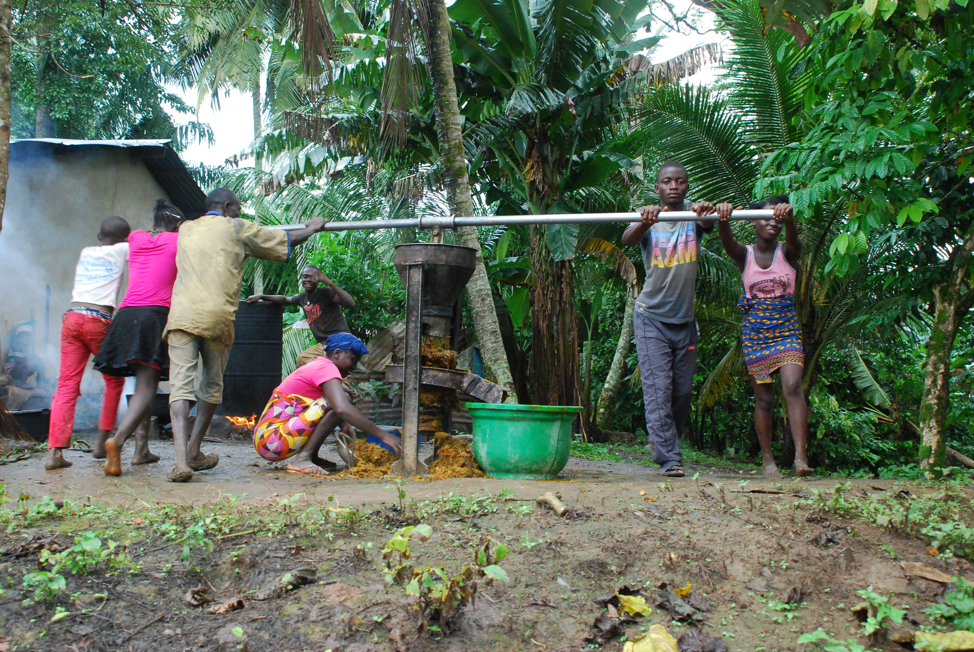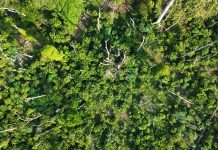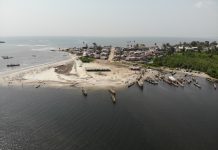Banner Image: Smallholder palm oil producers use a handheld mill to make oil in Foya, Lofa County. The DayLight/James Harding Giahyue
MONROVIA J-Palm Liberia (JPL) and an international foundation have formed a partnership to improve access for 7,500 smallholder oil palm producers in rural Liberia to more efficient processing technologies and markets.
The partnership with Whole Planet Foundation (WPF) will develop the wild dura palm value chain, the majority of which is unharvested, poorly processed, and unlinked to high-value export markets, according to a press release issued on Monday. J-Palm Liberia works to boost incomes and empower smallholder oil palm processors in rural communities by installing mini-mills in villages, reducing processing time by 90 percent and improving palm oil yield from fruit processed by wild fruit collectors from between 50-100 percent. WPF is a private operating, nonprofit organization that is dedicated to poverty alleviation, aims to empower the world’s poorest people with microcredit in places where it sources products.
“We started J-Palm primarily as a vehicle to improve the livelihoods of Liberia’s smallholder palm oil producers. This partnership with Whole Planet Foundation will enable us to scale our work to impact thousands of smallholder farmers and their families,” said Mahmud Johnson, Founder/ CEO of J-Palm Liberia in a press release on Monday. “We are extremely excited and honored to be partnering with the Foundation on this initiative, and look forward to beginning implementation.”
Palm is indigenous to West Africa and is radically different from the trees found on plantations in Southeast Asia or Latin America. Growing wild in Liberia, the majority of dura palm fruit goes unharvested, and the fruit that is harvested is processed by hand. Without investments into processing equipment, smallholders in Liberia are currently bypassed by global palm demand, which instead promotes palm from industrial plantations that can cause huge environmental degradation.
J-Palm purchases the palm kernels from palm harvesters, which were previously discarded as a waste product, transporting them to a central mill to produce palm kernel oil. This oil is currently undergoing organic certification, and once achieved J-Palm plans to export to the US – where purchasers will be able to know exactly which harvesters have produced their oil, through full blockchain traceability that J-Palm is implementing within its supply chain, according to the release.
This partnership will enable J-Palm to construct an additional 30 processing sites in Bong County, to enable 7,500 smallholder farmers to produce and trade their oils more efficiently, the release added. The Whole Planet Foundation financing will also create a pathway for J-Palm to turn over ownership of the machines to the smallholder farmers over a specific period of time, based on mutually agreed targets between J-Palm and the farmers.
“The Foundation is proud to support J-Palm Liberia and the impact our partnership will create in Liberia where the entrepreneurial spirit is strong,” Joy Stoddard, Development and Outreach Director of Whole Planet Foundation said in the release. “A partner like J-Palm Liberia is the key to emboldening that spirit with expert support for smallholder farmers and their families who are working hard to escape poverty.”
In 2019, J-Palm formed a partnership with Pacha Soap, a US-based manufacturer of all-natural soaps and bath products. Pacha’s soaps are sold nationwide in Whole Foods in the US. In 2022, Pacha Soap will have bars of soap in Whole Foods Market stores with J-Palm’s wild harvest palm kernel oil as part of the soap base. Fundamentally, this enables J-Palm Liberia to increase incomes for smallholders and to continue to invest in further mini-mills to reach more smallholders.
In 2020, J-Palm received a grant from the United States African Development Foundation (USADF) to fund the construction of 20 processing sites for smallholder oil palm producers in Bong County, Liberia. The USADF grant also funds the construction of a new Palm Kernel Oil processing factory, as well as equipment such as a generator, trucks, and processing tools.
The Whole Planet Foundation funds will further expand the project to an additional 30 communities, making for a total of 50 communities. This partnership with the Foundation proves that development financing from organizations such as USADF has the potential to catalyze additional investments from other partners, making it more viable to deliver solutions to under-resourced communities.





Facebook Comments